The British Shorthair cat is the most popular pedigree breed in the UK; they are a large, affectionate and easy-going breed that make excellent companions.
Their laidback attitude, loyalty and sweet nature make them a great first pet cat and a perfect option for a family or multi-pet environment.
British Shorthair’s are considered the ‘teddy bear’ of the cat world with their powerful well-developed bodies, full cheeks, large eyes and cuddly personality.

Introducing a British Shorthair cat to your home will bring a lot of love and wonderful company into your life, let’s take a look at what makes these cats so special.
Contents
Why We Love British Shorthairs
This laidback, cool cat will often be found curled up on a sofa taking it easy.
They are very relaxed and despite their history as hunters they will choose comfort over physical exertion every time.
Although they should have toys as they do like to play and they will generally initiate playtime with you.
They can be very independent and are quite capable of keeping themselves occupied. Although they aren’t needy they do enjoy your company, rather than laying in your lap they tend to be happier snuggled by your side.
While British Shorthair cats won’t be in your face demanding attention, they do like to stay close so when you’re at home you will usually find them nearby keeping an eye on you.
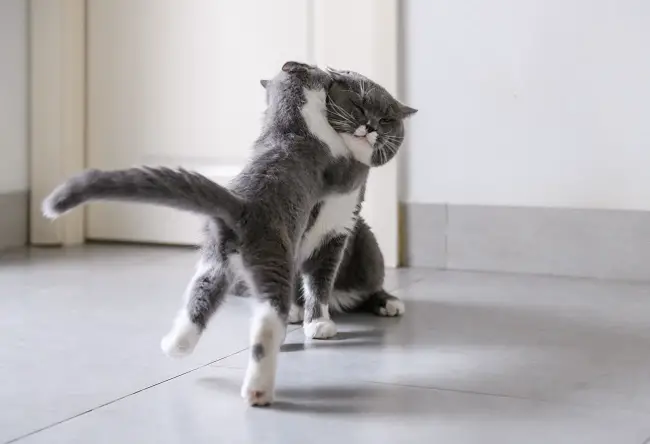
These cats like to feel like they are involved in your daily activities and may even follow you from room to room.
They take a long time to mature meaning you’ll still be seeing kitten-like playfulness for a good couple of years, they just never want to grow up!
When they do mature, they become less enthusiastic for high energy activities, opting to relax instead.
It wouldn’t be unfair to say a mature British Shorthair is a bit of a couch-potato but that’s not necessarily a bad thing!
Friendly & Family-Orientated
These cats are great in a family environment thanks to their affectionate and docile nature.
They enjoy the attention of young children but do not like to be picked up so as long as they have four paws safely on the ground they are more than willing to be stroked and loved.
Unlike many breeds, the British Shorthair are also good with cat-friendly dogs and other animals.
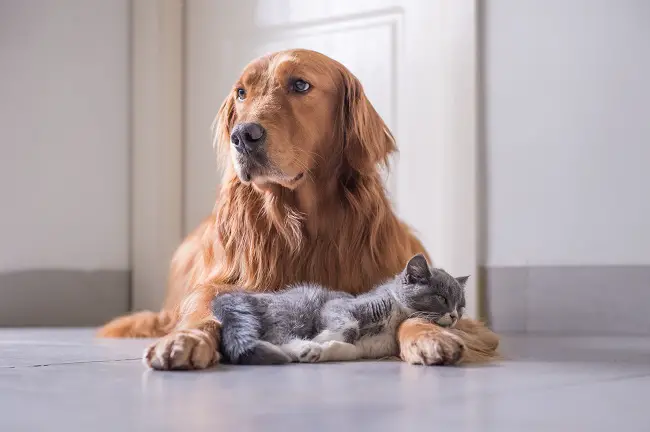
Their placidness means they are tolerant of children and won’t get aggressive.
It shouldn’t come to this, but if British Shorthairs are annoyed or upset they will generally walk away from the situation and hide, removing themselves from the situation rather than getting hostile.
It is also unlikely that they will scratch or bite during play as they are very gentle animals.
If you opt for a British Shorthair, you will have an intelligent, dignified and affectionate companion. All they want is to be in a home with people who love them and this will make them content.
They’re Even Internet Sensations!
These cats are intelligent, very aware of their surroundings and they recognize their owner’s voices. They are also social; enjoying the company of people, other cats and even other animals, this makes them a popular choice as a service animal.
British Shorthairs have been charming people with their sweet looks and lovable personalities for a long time, they are even the inspiration of a lot of popular culture so you have probably grown up around British Shorthairs without realizing it (think the Cheshire Cat and Puss in Boots).
There are many Instagram accounts dedicated to British Shorthairs with hundreds of thousands (even in a few cases, millions) of followers because we can’t get enough of how adorable and photogenic they are. After all, these cats aren’t the most popular cats in the UK for no reason.
British Shorthair Appearance
Despite being shorthaired, these cats are very fluffy thanks to the density and abundance of their fur. If you’ve never felt their fur before you are in for a very pleasant surprise!
Their coat is luxurious and plush – you’ll want to cuddle them all day long.

The British Shorthair is a well-rounded, strong cat that has a broad chest, short strong legs and rounded paws. A key feature of this breed is their large head and sweet face.
They have small rounded ears, large eyes that are deep and often orange or bronze in colour and an upturned mouth that gives the impression of a subtle smile.
This breed is well known for being blue (grey) in colour but they actually come in many different colours including black and white, calico, blue spotted, pure white and even blonde.
Generally, they can come in almost any colour combination.
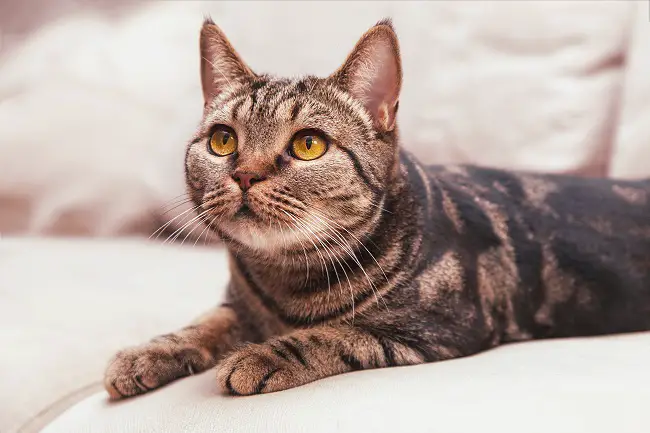
This is one of the few breeds that has a noticeable difference between the sexes.
Male British Shorthairs are considerably larger than females.
Females weigh between 7-12 pounds (3.2 – 5.4kg) while males can weigh up to 17 pounds (7.7kg).
Ideal Grooming Routine
British Shorthairs are very easy to care for and manage. Their beautiful coat will require weekly brushing to remove dead hairs and prevent knots from forming.
Regular brushing will also help to keep hair from shedding around your home (check out our cat brush reviews).
During seasonal changes when their coat is thinning or thickening, daily brushing is advised.
You will only need to bathe a British Shorthair if you are showing and competing them, otherwise they tend to keep themselves quite clean without the need for baths.
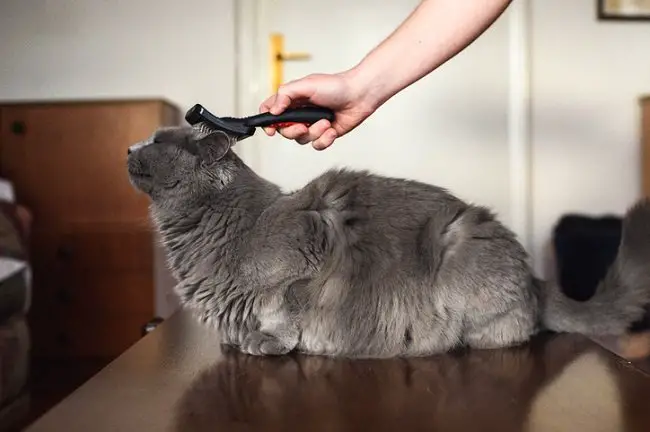
The simplicity of the British Shorthair care requirements is one of the reasons they have been so popular over the years; each week a quick brush and a gentle wipe of the ears is the extent of grooming necessary.
Does a British Shorthair Suit Your Lifestyle?
This is one of the few pets that fits into a busy lifestyle with ease. These kitties can tolerate being alone but enjoy spending time with you when you are around.
They are happy to do their own thing and keep themselves entertained until you get home.
While these cute kitties are happy to spend time alone, they may benefit from having another cat in the home. As cats are social animals and British Shorthairs in particular are very friendly and affectionate.
If you do tend to be out quite a lot, having two cats may reduce the stress of regularly being left alone for long periods of time.
These cats are at home and comfortable in all lifestyles so whether you live in a town or the countryside, your British Shorthair will feel right at home.
They can be indoor cats (its not cruel to keep your cat indoors – British Shorthairs are quite happy inside) or outdoor cats (if it’s a safe outdoor environment). An ideal situation would be for your cat to have an enclosed outdoor run to give them the option to spend time outside if they’d like to.
The British Shorthair is adaptable, easy-going and fits into just about any lifestyle.
Common Health Concerns
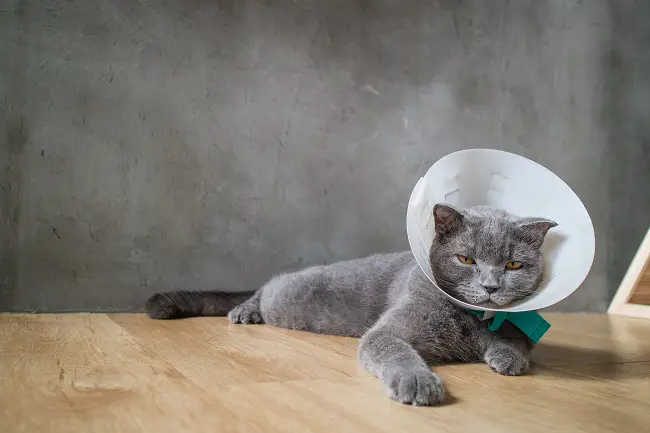
This breed is very hardy, they have long lifespans of 14-20 years with the breed average being 15 years (equivalent to 76 human years) of age.
Although there are no specific illnesses that these cats are prone to, there is a small chance of them being affected by polycystic kidney disease (PKD) due to the breeding with Persians in the past.
PKD is a progressive kidney problem due to cysts, there are gene tests available for this disease and breeders should be aware of this.
Another possible health concern is hypertrophic cardiomyopathy (HCM) which is a condition that affects the muscular walls of a cat’s heart. HCM is suspected to be an inherited condition in British Shorthairs so this is something to be aware of.
Strong & Stocky but Not Overweight
One of the more prevalent issues in this breed is obesity and all of the health problems that come with it.
The laid-back nature of the British Shorthair means they don’t often carry out high-energy activities or burn many calories. Due to this, it is very important to ensure they aren’t overindulging in food and gaining weight.
The big build of the British should be muscle – not fat from eating too much – so monitor this.
Your local veterinarian will be able to give you feeding advice on food type, frequency and portion sizes. Regular activity such as playing with toys or even a cat exercise wheel will help keep your cat in shape.
Overall, British Shorthairs are strong, healthy cats that live long lives when they are properly cared for and have a good quality diet.
Nutrition & Dietary Advice
As they can be particularly inactive, it is important to choose the right food for your British Shorthair to avoid weight gain.
Although it takes a few years for this breed to fully mature, they only require kitten-specific food for the first year as this is when most of their growth and development takes place.
Once your kitten is around 1 year old you can transition to an adult cat food.
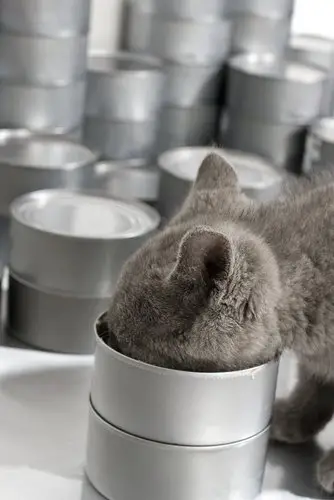
Kittens should be fed two – three small meals a day and food should not be left lying around, remove the bowl after 10 minutes as overfeeding and all-day access to food leads to obesity.
There is no denying that British Shorthairs have healthy appetites and are not picky when it comes to food, be warned that if you leave one of these cats unsupervised around food they are bound to consume it (even if it’s a food that doesn’t seem particularly appealing to cats!).
A good diet for a British Shorthair consists of a good quality base that is high in protein, moderate in fats, low in carbohydrates and has the correct proportions of vitamins and minerals.
Vegetable ingredients are largely unnecessary so keep these to a low amount.
When choosing a cat food look out for named meats in the ingredients lists, low carbohydrates and no artificial colours, flavours or preservatives.
Ultimately, it is up to you whether you choose to feed wet food, dry food, raw food or homemade food – as long as the food is high quality and provides your cat with the nutrition they need.
Portion control is essential for these hungry fluff balls, don’t let their adorable eyes get the better of you! Make sure your cat has fresh, clean water available at all times too (a cat water fountain can help).
Refer to the recommended portion sizes on the cat food you are using, portion sizes are usually based on the cats age and weight, you can also speak to your vet who will be able to advise you on portion sizes and food types.
Foods to avoid:
- Grains
- Dairy (including milk)
- Onion, garlic, chives
- Grapes & raisins
- Chocolate
- Raw eggs
- Raw meat & bones
- Dog food
History of the British Shorthair
British Shorthairs are native to England, their roots go back hundreds of years.
They are not only the UK’s most popular breed, they are also the first official show cat.
This goes back to the 1800’s when Shorthairs were displayed and judged, allowing strengthening of the breed.
This show was held in 1871 by Harrison Weir and was the first of its kind. These shows were extremely popular with cat enthusiasts and this was how Weir became known as “The Father of the Cat Fancy”.
British Shorthairs arrival in Britain is actually historically tied to when the Roman’s invaded Britain.

The Romans were said to have brought the cats with them to help keep rodents away from their food supplies.
Back then these now ‘couch-potato’ cats were known for hunting and were generally appreciated for their hunting skills and good nature.
For a while, the Shorthair was a working cat and lived on the streets without issue. Their sweet nature meant they then began to be welcomed into homes too.
Unfortunately, British Shorthairs were severely impacted by the World Wars.
Due to this population demise, other breeds such as Persian, Russian Blue, Chartreux and Burmese were added to the gene pool to prevent the British Shorthair breed from completely dying out.
It took generations of breeding for the British Shorthair to be once again eligible for registration as pedigrees.
Bringing a British Shorthair Home
As this breed is the most popular in the UK, there will be a lot of choice when you are looking for a kitten. If you have a specific colour or pattern in mind, you may need to look further afield but generally you’ll find British Shorthairs with ease.
It is important your cat is healthy and happy so it matters where you bring your kitten home from.
You may want to adopt one from a local rescue centre or buy one from a reputable breeder.
Reputable Breeders
If you choose to go to a breeder for your British Shorthair, make sure they are a reputable breeder. These breeders abide by ethics that outline the breeder’s responsibilities and ensure the process is undertaken properly.
There are some breeders who do not operate ethically and use cats as a way to make money without providing the necessary care or ensuring the cats welfare is a priority so these breeders should be avoided at all costs.
Find a breeder who raises the kittens at home and has performed health screenings to rule out genetic health problems. Kittens raised in isolation are often skittish, fearful and have socialization issues.

When buying from a breeder, visit the facility and don’t be afraid to ask questions. If you do not know of any good breeders, ask your veterinarian who will be able to refer you to a breeder, rescue organization or other reliable source.
Putting additional time into finding the new addition to your family will pay off in the long run as it will help you to work out which breeders are trustworthy and high quality and which you should avoid.
Choosing a proper breeder will help you to avoid health issues and costly veterinary bills in the future.
Of course, there is no way to guarantee you pick up a healthy kitten but you increase the chances by being patient and doing your research.
Questions to Ask Cat Breeders
Reputable breeders should be happy to answer any questions you have. If you’re not sure what to ask here’s some of the top questions we recommend:
- How long have you been breeding cats?
- How many cat breeds do you work with?
- How many litters do you raise in a year?
- Do they spay/neuter the kittens before they go to their new homes?
- What age do the kittens go to their new homes?
- Can I meet the mother (& father, if possible) of the kittens?
- How are the kittens socialized?
- What paperwork do you provide new owners?
- What genetic problems are seen in the breed (& do you test for these problems)?
- Do you offer a health guarantee?
Also ask about the parent’s health and the general health of the litter. The breeder should be able to provide you with all the information regarding their vaccinations, vet visits, deworming and so forth.
5 Breeder Red Flags
It can be very difficult to spot which breeders are legit and which are underhanded so here’s some common red flags you may experience when looking for a new cat.
- No contract or health guarantees
- Does not allow you access to their cattery
- Selling the kittens before they are 12 weeks old
- Kittens have not been socialized
- Kittens have not been to the vet
Adopting from a Shelter
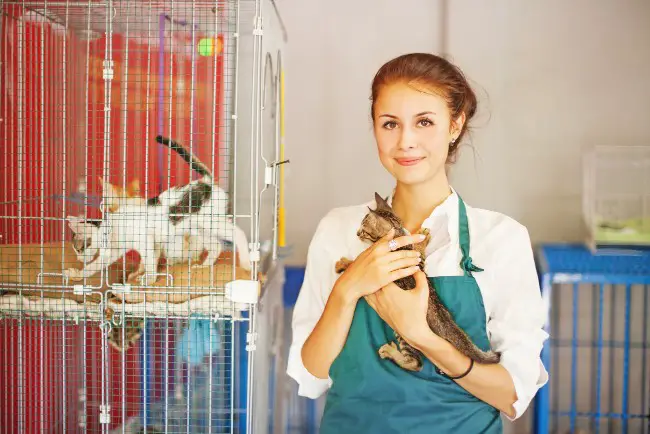
You may find British Shorthair cats at your local cat shelter looking for their forever homes.
When you adopt from a shelter the cat will have had a full health check, complete vaccinations and spaying/ neutering. This is also a low-cost option and you’ll be saving a cat in need.
Another bonus of adopting a cat from a rescue centre is that the staff will be able to tell you more about the personality and likes/dislikes of the individuals so you can more easily find a cat that will suit your lifestyle.
Rescue centres often have cats of all ages so you may find kittens in need of homes as well as older cats.
Frequently Asked Questions
As a popular breed, there are many questions people ask about British Shorthairs. Here are the answers to the most commonly asked questions:
- Can a British Shorthair cat be an only pet?
Yes, these cats are strong and independent so can be left alone while you are out at work.
However, they shouldn’t be left alone for too long as this will cause loneliness, depression and other medical conditions.
- Can I keep my British Shorthair inside?
Yes, they are happy to be indoor cats. If they have the option of going outside they enjoy this but it is not essential.
As long as they have opportunities to play and things inside to keep them busy it is not a problem.
- How much food should I give my cat?
This depends on your cats age, weight and the type of food you are feeding them.
The food packaging should offer feeding guidelines and your veterinarian will also be able to provide additional advice and support regarding feeding and nutrition.
If you are concerned your cat is gaining weight, losing weight, eating too much or not eating enough (be aware your cat will eat less during hot weather), it is best to take them for a checkup.
- Can I give my British Shorthair snacks?
You can give them snacks; however, we emphasize how easily this breed gains weight so snacks should be few and far between to avoid overfeeding.

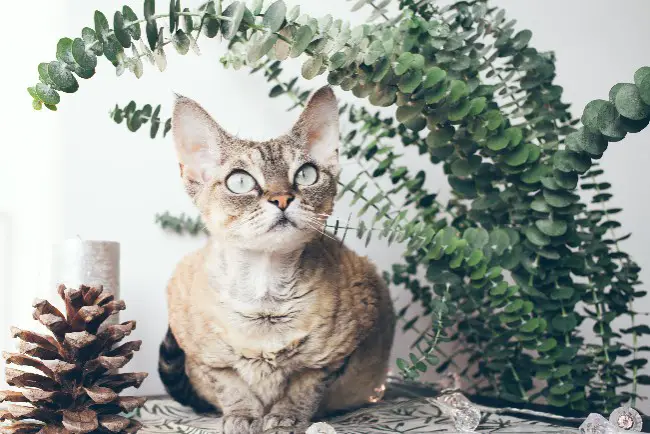
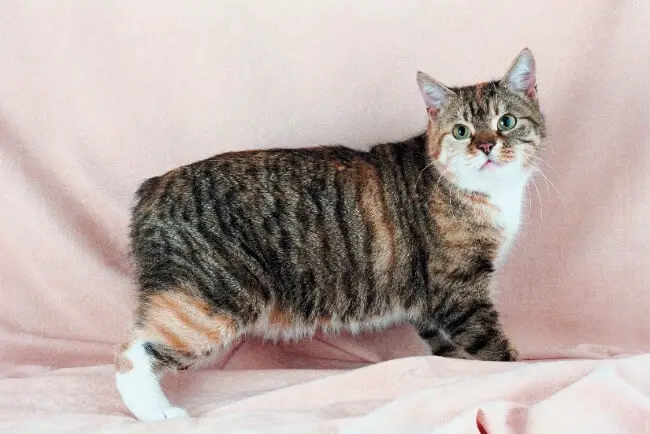
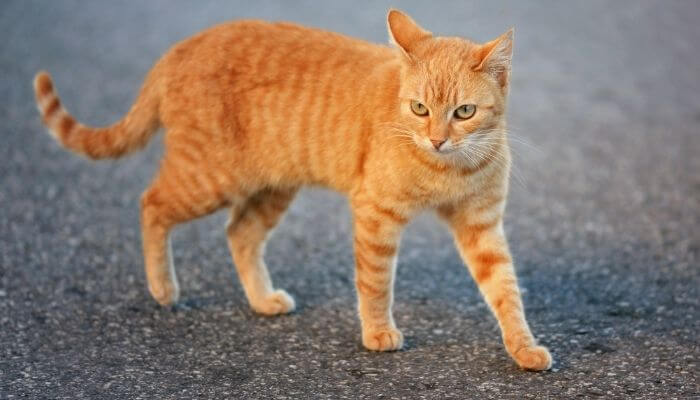
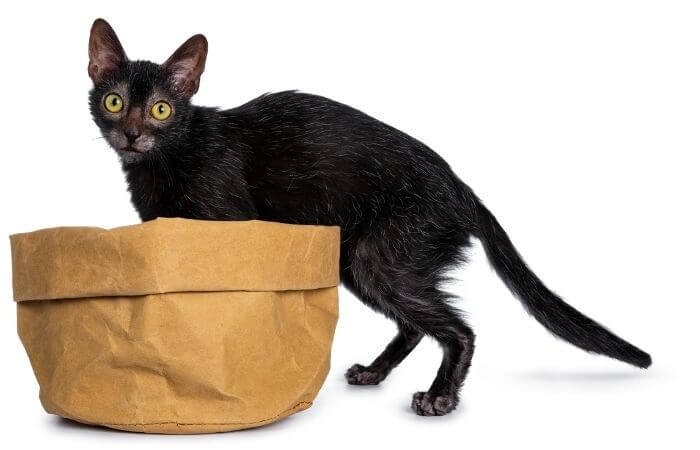
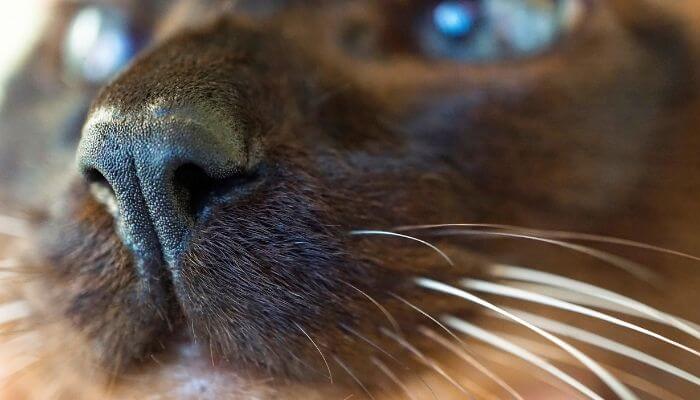
Leave a Comment